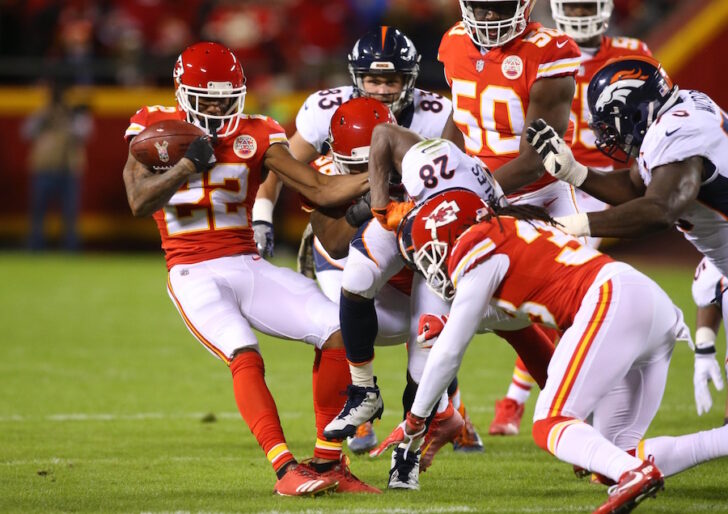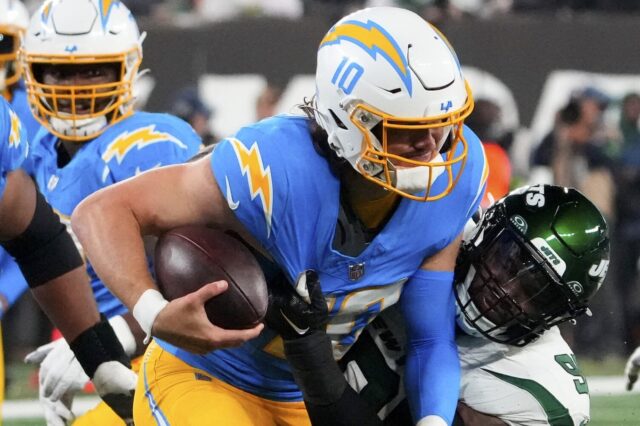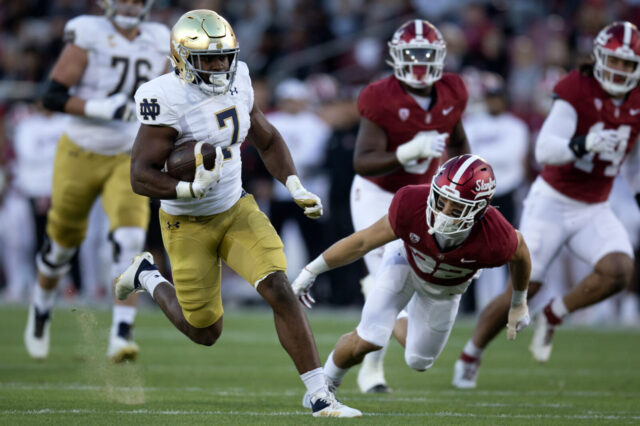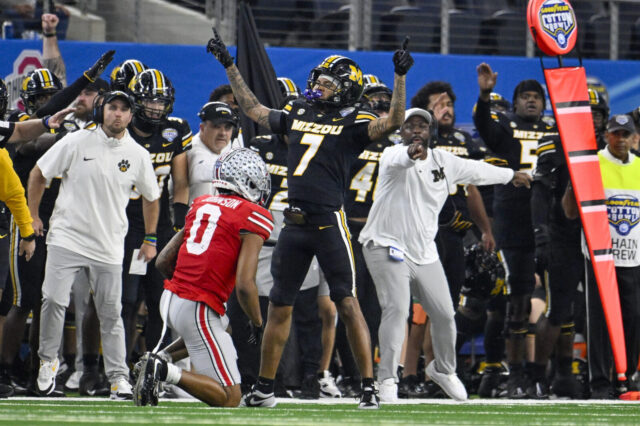The Denver Broncos fell to 3-4 on the season with a Week 8 loss to the Kansas City Chiefs at Arrowhead Stadium in a game that was simultaneously closer and more-lopsided than it looked. That might sound like an oxymoron, but it’s true.
With 1:14 remaining in the third quarter, the Broncos trailed by just a touchdown. Were it not for a failed gadget play called by Andy Reid in the first quarter, Denver might have trailed 21-0 (or worse) at the half.
Denver produced twice as many Kansas City turnovers in the game (two) as the Chiefs had committed in seven games prior. At the same time, the Broncos gave the ball away five times themselves and now rank 31st (ahead of only winless Cleveland) in turnover margin at minus-11.
The Denver defense held Kareem Hunt and Tyreek Hill to a combined 106 yards from scrimmage, and held Kansas City to just one offensive touchdown. The Broncos’ running game produced 177 yards on the ground and Denver found the end zone twice on offense.
Denver earned more total yards and first downs, and won the time of possession. Meanwhile, the defense again let at tight end get the better of them.
So what else did we learn from this Jekyll-and-Hyde performance? Here are five takeaways from a game that involved five giveaways by the Denver offense/special teams.
Trevor Siemian is seeing ghosts
It was clear in the very early going that Broncos quarterback Trevor Siemian is playing scared. After six games of getting his bell rung (blame both the offensive line and Siemian’s indecisiveness), the third-year QB was clearly skittish against the Kansas City pass rush. Siemian missed on his first three pass attempts of the game, skipping balls at the feet of his receivers or missing badly wide. His fourth attempt went right into the hands of KC defensive back Marcus Peters.
Well before the Chiefs’ defensive front broke through for three sacks in the game, Siemian was rushing throws and hurrying his progressions. Only three teams have allowed more sacks than Denver’s 25 so far this year (and the Broncos have already had their bye, mind you); Siemian was playing (especially early on) like a quarterback afraid to take another. ESPN color analyst Jon Gruden saw it countless times from the broadcast booth; you can bet the Chiefs defense saw it plain as day on the field.
Joe Woods has his defense (mostly) focused
Last season the Denver defense let their emotions get the best of them at times. Their frustration with lackluster play by the offense and special teams boiled over. (Remember Aqib Talib‘s shove of Jordan Norwood after a muffed punt?) New defensive coordinator Joe Woods seems to have his unit worried only about themselves this year.
While they are still not quite at the halfway point of the season, the defense seems to be in much better control of their emotions – and thus in much better control when times get tough. (There was no shoving of Isaiah McKenzie when he muffed a punt early in the second half, costing Denver their first possession and backing up the defense in their own end.)
On Monday the Denver defense did everything possible to give the offense a chance to get back in the game. They forced a pair of turnovers. They held Kansas City to four field goals in the second half, despite three of those drives starting in Denver territory with an average field position of the 29-yard line.
Minus a costly neutral zone infraction against Derek Wolfe that changed a third-and-10 to a third-and-5 (which KC converted) and continued struggles covering tight ends (Talib needs to be a second jersey on Travis Kelce the next time they meet), the Denver D looked strong against one of the best offenses in football – even when times got tough.
Isaiah McKenzie needs to play within himself
The Broncos were quick to hand rookie Isaiah McKenzie the punt return duties this year after a strong showing in training camp and the preseason. The former Georgia Bulldog outworked his competition and earned the job thanks in part to his sure handedness (one of his favorite drills is to field punts while holding multiple balls in his hands).
In his last three games (he missed one with injury), however, McKenzie has four fumbles on punt returns – including a muffed punt inside his own 20 against Kansas City. On his very next opportunity Monday, McKenzie fielded the ball cleanly but carried the ball like the proverbial “loaf of bread” and very easily could have had it knocked away on the return.
The speedy McKenzie has big-play potential, but right now he needs to focus on maintaining possession and getting the ball into the offense’s hands after a change of possession.
Running the ball works
Vance Joseph and offensive coordinator Mike McCoy have been prone to deviate from their game plan when Denver falls behind early in games (see all three losses prior to Monday night). Against Kansas City they decided to stick with the plan to run the ball as much as possible and as much as time would allow, and it had them within one score late in the third quarter.
Denver’s running backs produced 157 yards on the ground against KC, and it’s no surprise that their scoring drives all featured heavy doses of C.J. Anderson and Jamaal Charles. Devontae Booker even saw significant touches on Monday night and turned those into a rushing touchdown and a nice 26-yard scamper.
The Broncos’ strength on the offensive line is their run blocking. Matt Paradis and Ron Leary are among the best in the game in that area. The rotational players at guard (Max Garcia, Allen Barbre and Connor McGovern) can hold their own. And it’s no secret that Menelik Watson and Garett Bolles are far more effective in that role than in pass blocking (especially against elite units like Kansas City). Playing to that strength has to be a priority if the Denver offense is going to get on track.
Emmanuel Sanders has to get back on the field
Trevor Siemian looked awful at times in the loss, prompting calls for Brock Osweiler or Paxton Lynch (when he’s healthy), but the receivers had their fair share of dropped passes in the game.
Bennie Fowler dropped multiple passes, including one in the end zone. Cody Latimer had a key drop. Virgil Green had one go in and out of his hands on a crucial third-down late in the game. Two of Siemian’s three interceptions came on passes targeting Jeff Heuerman and Jordan Taylor.
No offense to any of those players, but none of them are ideal targets compared to Emmanuel Sanders, who is still dealing with an ankle injury and did not practice last week. Sanders has now missed consecutive games, and it should come as no surprise that the offense has struggled at times in both contests (including being shut out in Los Angeles).
Had Sanders been the target on any of those drops or interceptions, there’s a chance the game might have played out better for Denver.



